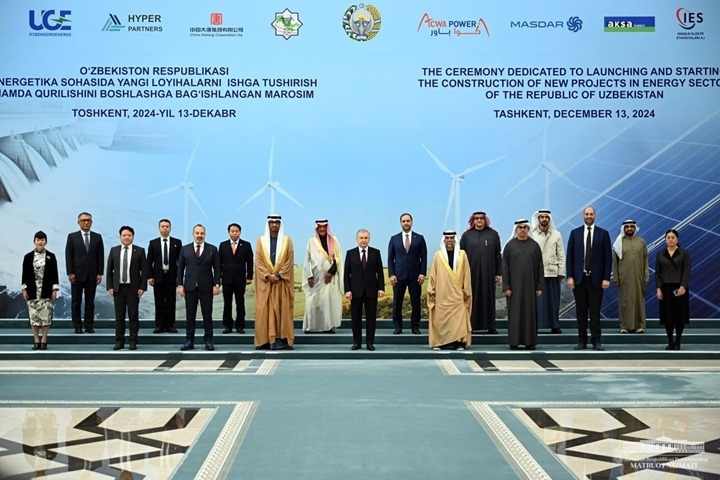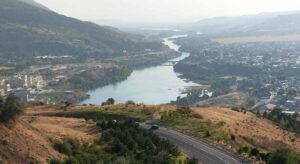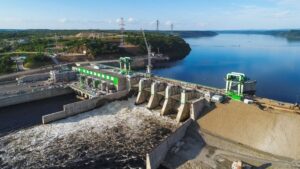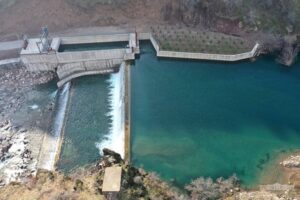At the International Congress Center in Tashkent, President of Uzbekistan Shavkat Mirziyoyev took part in the ceremony to begin construction of the next projects in the energy industry and launch new energy capacities, including four small hydroelectric power stations, the presidential press service reports.

In his speech, the head of state noted that this event is historic in the energy sector, as new capacities worth $3.7 billion are being launched, and construction of six new projects is beginning.
In particular, five solar and wind power plants with a total capacity of about 2.3 thousand megawatts, as well as five high-voltage substations, are being launched in the Bukhara, Navoi, Namangan and Tashkent regions.
In Uzbekistan, for the first time, large storage systems with a capacity of 300 megawatts have been built in Andijan and Fergana.
In addition, a 400 megawatt power plant is being put into operation in Kashkadarya, and a modern cogeneration unit is being built in Tashkent. Four small hydroelectric power stations are starting to operate in the Andijan, Surkhandarya and Tashkent regions.
As a new stage of cooperation with foreign partners in Fergana, Samarkand, Navoi, Tashkent regions and Tashkent, the construction of six electrical capacities with a total cost of $3.5 billion and a capacity of 2.5 thousand megawatts begins.
The launch of these capacities and the implementation of new projects will allow next year to produce an additional 9.5 billion kilowatt-hours of electricity, save 2.5 billion cubic meters of natural gas and avoid emissions of 4.6 million tons of harmful gases.
Overall, 84 billion kilowatt-hours of electricity will be produced next year, which is 25 billion kilowatt-hours or 1.5 times more than in 2016.
Projects are being implemented with reliable partners such as Masdar, Acwa Power, Aksa Energy, as well as companies from China and Germany.
«Considering that all these projects are financed through foreign direct investment, this is a clear confirmation of trust in us and the reforms we are carrying out», — said the President of Uzbekistan.
Special thanks were expressed to the Asian Development Bank, the Asian Infrastructure Investment Bank, the Islamic Development Bank, the European Bank for Reconstruction and Development, and the World Bank for their financial and technical assistance in implementing these projects.
It is noted that today’s projects are an integral part of the large-scale reforms that began in the energy sector 8 years ago.
During this period, Uzbekistan took significant steps in the development of «green energy».
As a result of its wide opening to the private sector, almost $20 billion of foreign direct investment has been attracted to the energy sector over the past 5 years.
The previously fully publicly owned system now includes 24 independent energy producers.
In the «green energy sector», 16 large solar and wind power plants with a total capacity of 3.5 thousand megawatts or the equivalent generation of 10 billion kilowatt-hours have been put into operation to date.
Due to this, the share of «green energy» in 2024 was increased to 16%. This means that in a short period of time, the capacity of environmentally friendly energy was increased by 2-3 times.
As part of the Paris Agreement, Uzbekistan committed to reducing emissions of harmful gases by 35% by 2030. The country’s president said he was ready to expand this commitment until 2050.
In addition, 2025 was declared the «Year of Environmental Protection and Green Economy in Uzbekistan».
The head of state briefly focused on plans to bring reforms in the energy sector to a new stage.
By 2030, it is planned to build another 19 thousand megawatts «of green capacity», which will increase the share of renewable energy to 54%. In particular, in 2025, 18 solar and wind stations with a capacity of 3.4 thousand megawatts and storage systems with a capacity of 1.8 thousand megawatts will be put into operation.
As a result, «green energy» production will reach 12 billion kilowatt-hours next year.
This is equivalent to the annual consumption of 5 million households and will prevent the release of 6.5 million tonnes of harmful gases into the atmosphere.
Over the next two years, a large-scale program will be implemented to create more than 2 thousand small and micro-hydroelectric power plants together with private entrepreneurs.
In addition, support for the entry of the private sector into the industry will continue and big steps will be taken to create an electricity market.
In particular, by the end of next year it is planned to create a wholesale electricity market using competition.
In addition, public-private partnerships will be widely implemented not only in large power plants, but also in other areas of the industry.
Regional and international cooperation will be expanded in the field of «green energy».
As a first practical step in this direction, COP29 signed the first agreement with partners from Kazakhstan, Azerbaijan and Saudi Arabia to export «green energy» to the European region.
To ensure the sustainability of the regional energy system, a single platform will be created with neighboring countries.
«Green energy» is becoming a new driver for the rapid development of other industries and improving the standard of living of the population. In particular, there is great interest from the population and local entrepreneurs in this area.
In order to stimulate such enterprises in regional development programs, the share of «green projects» will be increased 5 times over the next 5 years.
In this direction, cooperation with industrial enterprises will be expanded within the framework of the dual education system in technical schools, and advanced engineering schools will be created in 5 universities.
In addition, cooperation in research and development with leading companies in the energy, metallurgy, chemical and electrical industries will be expanded.
«I want to assure you all: New Uzbekistan – is a country that provides comprehensive guarantees for investment, fully supports your projects and initiatives, protects the interests of foreign partners and is open to the world», — the president noted at the end of his speech.
The head of state pressed the symbolic button, launching completed facilities and starting construction of new projects.




